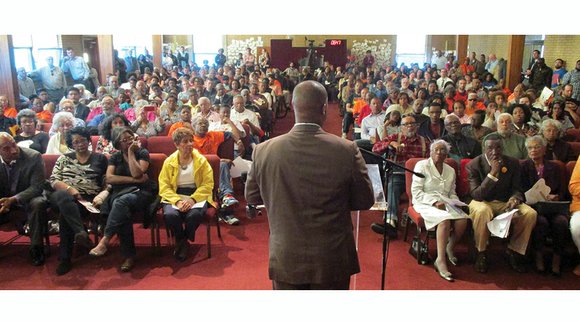Frustration growing
City Council offers amendments to add millions of dollars to RPS while School Board approves cost-cutting measures
Joey Matthews | 4/22/2016, 5:08 a.m.

Community members are becoming increasingly angry and concerned about the future of Richmond Public Schools, especially after the Richmond School Board voted Monday to cut costs by shutting down two North Side buildings and implementing a new bus transportation system in the fall of 2016 that will make it more difficult for some students to get to their schools.
The plan will require middle school and high school students to go to the nearest elementary school each morning to catch a bus to their schools.
The board also voted to close the Norrell and Norrell Annex buildings in North Side where school administrators work and to demolish the former Elkhardt Middle School in South Side. The administrators would be moved to the Richmond Alternative School building in Jackson Ward.
The School Board is still considering closing Armstrong High School and four elementary schools, along with potentially consolidating three specialty schools into one.
The board’s vote came during a stretch of meetings, work sessions and news conferences by school officials, community members, the Richmond City Council and Mayor Dwight C. Jones aimed at grappling with a $18 million funding gap in next year’s school budget.
While Mayor Jones continues to hold the line against increasing spending for Richmond Public Schools, City Council indicated earlier Monday that it wants to provide at least an additional $4.97 million for teacher pay raises beginning in July.
It did so at a work session where council members discussed their individual and co-sponsored proposed amendments to the mayor’s general fund and capital budget plans.
Meanwhile, the School Board took action on the cost-cutting measures that the administration estimated would save about $1.1 million annually.
Prior to the vote, board member Tichi Pinkney Eppes, 9th District, asked her colleagues to add an amendment that would eliminate the cost-cutting proposal to close Armstrong High School and the elementary schools and to consolidate the three specialty schools.
“In reality, I don’t think we’re going to close any schools, and I think we need to stop playing these games,” she said.
Board member Mamie Taylor, 5th District, joined Ms. Pinkney Eppes in voting for the amendment. But their efforts failed as the board’s seven other members said they preferred to keep the closings on the table as budget negotiations continue.
The possible closings have galvanized the community, with more than 20 people speaking against it at Monday’s board meeting.
“Why would you want to close the only black high school in the East End?” Michael Alexander, a 1969 Armstrong High graduate, asked board members.
“Do not put a lock on that school on Cool Lane!” he said, his voice rising.
City Council sought Monday to address some of the community’s concerns over what they see as a dispassionate response by city leaders to the schools problems. All nine council members submitted amendments that would provide anywhere from the $4.97 million for the teacher pay raises up to the full $18 million that would allow RPS to fully implement its academic improvement plan.
However, no council members have said yet where the money would come from.
At one point during the discussion, Councilman Parker Agelasto, 5th District, suggested the possibility of applying a service charge on real estate owned by nonprofit organizations and city-connected agencies such as the Richmond Redevelopment Housing Authority to increase revenues.
“I’m open to looking for what actually is needed to provide for every child’s education, welfare and well-being,” said Cynthia I. Newbille, 7th District, who was one of the six council members to propose the amendment to provide $4.97 million in additional funding. “This is important to us all.”
The $4.9 million would provide an average salary increase of 4 percent each year over the next two fiscal years for the school system’s 2,300 instructional staff members, Ralph Westbay, the district’s assistant superintendent for financial services, told the Free Press.
However, after council members listened to public safety officials, school leaders and others express concerns about the impacts that any budget alterations would have on their ability to deliver services, they adjourned the meeting after two and a half hours without voting on the amendment to raise teacher pay or any other amendments.
“We’re right back where we started,” Council President Michelle R. Mosby said, before closing the meeting.
They agreed to meet again at noon Monday, April 25, to consider budget amendments.
The flurry of budgetary maneuverings by City Council and the School Board came after Mayor Jones reiterated his intent last Friday at a City Hall news conference not to seek any additional funds for RPS in the $709 million spending plan he presented to council last month.
“There’s no mention of where the money would come from. And that is a problem,” the mayor said, as city Budget Director Jay Brown, Deputy Chief Administrative Officer Lenora Reid, Chief Administrative Officer Selena Cuffee-Glenn, Police Chief Alfred Durham and Fire and Emergency Services Chief Robert Creecy stood behind him.
“We all want schools to have more money. No doubt about that. We just need to be clear about the impact where the money is shifted from,” Mayor Jones said.
Mayor Jones also criticized council members for not providing their proposed amendments to his administration earlier.
City Council is required to approve a new schools budget by May 15, but could do so earlier.
By Joey Matthews
Dorothea Hobson Winfree and Daionese Johnson Bradley attentively sat in the front pew at Mt. Olivet Church in the East End at last week’s community rally to help save their alma mater, Armstrong High School, and other city schools from closing.
The longtime friends attended Armstrong for three years before moving in 1942 to Maggie L. Walker High School, where they were part of the new high school’s first graduating class.
They joined a standing-room-only audience of about 500 people Thursday, April 14, to speak out against the plan that school leaders introduced two weeks ago to close Armstrong and four elementary schools and to consolidate three alternative schools.
The plan is to help trim an $18 million budget gap if Richmond City Council does not provide substantial additional funding in its overall budget for the district for fiscal year 2017.
“We’re here to attempt to preserve the name Armstrong because of the love and admiration we have for the school,” Ms. Winfree told the Free Press.
“We’re here to help save Armstrong High School because that’s an historic old school,” Ms. Bradley added. “It was the only black school we had for years until they built Maggie Walker High School” in 1938, Ms. Winfree said.
A few yards away, Armstrong High junior Taylah Daniels, a member of the school’s leadership program, volunteered at a table with rally information that included a cake decorated with the message, “Saving Armstrong.”
“Armstrong is so important to me,” she said. “Both of my older siblings graduated from here. People who look at it from the outside might not realize how good of a school it is and probably don’t recognize how many people care about Armstrong. I’ve never seen so many people care about Armstrong,” in light of the school closing proposal, she said.
The rally was organized by J.J. Minor, a community activist and 1993 Armstrong graduate. His intent, he told the audience, is to start a “You Will Not Close Our Schools” campaign.
“We will not let you do what you did to (former city schools) John Kennedy and Maggie Walker” in closing them, Mr. Minor said. “We will not let you erase our history. And we want to save other schools (proposed for closure). That’s what Wildcats do,” he said referencing Armstrong’s sports mascot.
Among those listening in the audience were RPS Superintendent Dana T. Bedden, School Board Chairman Jeffrey M. Bourne, Richmond City Council President Michelle R. Mosby and other city leaders. He told the audience to be respectful to Dr. Bedden, Mr. Bourne and others to speak at the rally.
Mr. Minor emphasized that city leaders alone should not have to shoulder the blame for the long-festering and wide array of problems that the school system faces.
“Turn to your neighbor and ask them, ‘Where have you been?’’’ Mr. Minor said, calling on all community members to get involved in efforts to improve the education of children in the city.
Rally participant Judith Collins said, “Education is a basic human right guaranteed by the 14th Amendment. All children deserve a first class, blue-ribbon education regardless of where they live.”
But the great challenge is the $18 million budget gap, Dr. Bedden told the audience.
“No decision has been made to shut anything down,” he assured them, stressing that any imminent school closures would be based on the funding that City Council provides in the budget it is scheduled to approve on or before May 15.
Mr. Minor asked schools officials a series of questions, including, “Why was Armstrong chosen?”
Assistant Superintendent Tommy Kranz said there are about 2,000 empty seats in schools located north of the James River. And a school facilities taskforce report estimates a huge growth in student population “south of the James River,” with a recommendation that RPS build a new high school in South Side, preferably at the site where George Wythe High School currently sits.
He also called some of the conditions at the aging Armstrong “a disgrace.” The football team plays on a field that resembles a “sandlot” and the track team can’t run on the school’s track because of “breaks in its rubber surface,” Mr. Kranz said.
The audience laughed and applauded when Pastor Michael Jones of Village of Faith Ministries in Henrico County offered a solution to the scruffy athletic fields at Armstrong.
“You want to know how to put grass on it? … let the Redskins play on it,” he said, referencing how the city and state pumped millions of dollars into building the Washington professional team’s training camp facility behind the Science Museum of Virginia in Richmond.
City Council member Jonathan T. Baliles, 1st District, told the audience that he and others on council had asked city officials to let RPS football teams play some of their games at the training camp, and they said, “Forget it.”
School leaders also have warned of possible clashes between students if Armstrong is closed and its students are moved to rival schools.
Latoya Percer-Turner, a 2000 Armstrong graduate who lives in South Side, had an even more dire prediction if Armstrong students are moved to other schools.
“If you think there are a lot of killings now in the city,” she said, “what you would see then is going to be a war zone.”
As the meeting wound down, Mr. Minor introduced a plan of action to fight the school closure plan.
He and others circulated a petition for audience members to sign. He also encouraged residents to attend the next School Board meeting Monday, May 18, along with the City Council meeting 6 p.m. Monday, April 25, at City Hall.
The meeting concluded with audience members joining a circle and singing the Armstrong High School alma mater.








